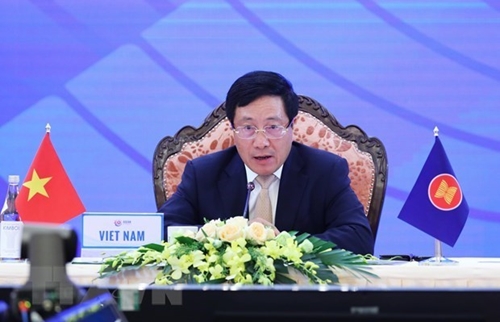Addressing the 23rd ASEAN - EU Ministerial Meeting, held via video conference on December 1, Minh lauded the EU for supporting ASEAN’s central role and solidarity in shaping an open, transparent, inclusive, and rules-based regional architecture with bloc-led mechanisms as the foundation, contributing to maintaining peace, security, stability, and law abidance in the region.
    |
 |
|
Deputy Prime Minister and Foreign Minister Pham Binh Minh at the meeting |
He suggested the EU, with its experience in regional connectivity, assist the bloc in narrowing development gap and linking sub-regions with ASEAN’s common development process, towards even and sustainable development.
On the East Sea issue, he affirmed that Vietnam’s stance suits ASEAN’s principle stance, which was affirmed at the 36th ASEAN Summit in June, the 53rd ASEAN Ministerial Meeting in September, and the 37th ASEAN Summit in November.
Minh asked countries to uphold the spirit of cooperation and sense of responsibility for building the East Sea (South China Sea) into the waters of peace, stability, and cooperation.
ASEAN heralded the EU as its partner of top significance, second-largest trade partner with two-way trade of USD 280 billion in 2019, and third-largest source of FDI with USD 16.2 billion last year.
The EU also announced a new initiative at the meeting to carry out a medical support program in Southeast Asia in response to COVID-19, within the framework of a EUR 350 million (USD 421.6 million) relief package the EU provided to ASEAN to improve its medical capacity.
Ministers also adopted the ASEAN - EU Joint Ministerial Statement on Connectivity and agreed to continue building the ASEAN - EU Free Trade Area and soon complete the ASEAN - EU Comprehensive Air Transport Agreement.
Both sides welcomed the recent official operation of the ASEAN Customs Transit System, with support from the EU’s trade facilitation program, which makes an active contribution to economic recovery and trade in the region.
Ministers highlighted the need to guarantee a regional environment of peace, security, and stability, and vowed to uphold international law, step up multilateralism, build a rules-based order in the region and the world, jointly address global challenges, and fulfill sustainable development goals.
They affirmed the importance of maintaining peace, stability, security, and maritime and navigation safety and freedom in the East Sea, where 40 percent of the EU’s goods pass through.
Participants expressed their support for promoting dialogue and building trust, exercising self-restraint, refraining from activities that could complicate the situation or escalate disputes, avoiding militarization, and settling disputes by peaceful means in line with international law, including the United Nations Convention on the Law of the Sea 1982. They also supported efforts to soon resume negotiations to reach an effective and efficient Code of Conduct in the East Sea in accordance with international law.
Source: VNA